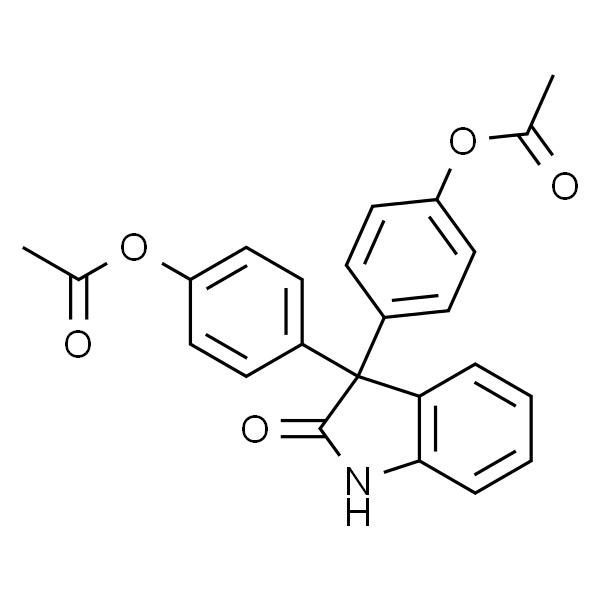双醋酚丁
货号:
IO1290
品牌:
Jinpan

暂无详情
产品简介
| 有效期 | 2年 |
| 描述 | 是一种具有生物活性或化学活性的化合物。 |
| MDL | MFCD00022793 |
| EC | EINECS 204-083-6 |
| InChIKey | PHPUXYRXPHEJDF-UHFFFAOYSA-N |
| InChI | InChI=1S/C24H19NO5/c1-15(26)29-19-11-7-17(8-12-19)24(18-9-13-20(14-10-18)30-16(2)27)21-5-3-4-6-22(21)25-23(24)28/h3-14H,1-2H3,(H,25,28) |
| PubChem CID | 8269 |
| 别名 | 3,3-bis[4-(acetyloxy)phenyl]-1,3-dihydro-2H-indol-2-one;Izafenin;Diphesatine;Brocatine;oxyphenisatine di(acetate);Promassolax;Acetalax |
| 英文名称 | Oxyphenisatin Acetate |
| CAS | 115-33-3 |
| 分子式 | C24H19NO5 |
| 分子量 | 401.41 |
| 储存条件 | -20℃ |
| 纯度 | ≥98% |
| 外观(性状) | White to off-white Solid |
| 单位 | 瓶 |
| 生物活性 | Oxphenisatin Acetate inhibits the growth of breast cancer cells by inhibiting translation, rapid phosphorylation. The pathways involved in apoptosis induction, starvation responses, and RNA/protein metabolism. Oxphenisatin Acetate also results in mitochondrial dysfunction.[1] |
| In Vitro | Oxyphenisatin acetate inhibits the growth of the breast cancer cell lines MCF7, T47D, HS578T, and MDA-MB-468. In the estrogen receptor (ER) positive MCF7 and T47D cells, oxyphenisatin acetate induces TNFα expression and TNFR1 degradation, indicating autocrine receptor-mediated apoptosis in these lines. Ten micromoles per liter Oxyphenisatin acetate treatment results in autophagy and mitochondrial dysfunction[1].In the estrogen receptor (ER) positive MCF7 and T47D cells, OXY induced TNFα expression and TNFR1 degradation, indicating autocrine receptor-mediated apoptosis in these lines. Lastly, in an MCF7 xenograft model, OXY delivered intraperitoneally inhibited tumor growth, accompanied by phosphorylation of eIF2α and degradation of TNFR1. OXY induces a multifaceted cell starvation response, which ultimately induces programmed cell death[1]. |
| In Vivo | Oxyphenisatin acetate (300 mg/kg, i.p.) delivers intraperitoneally inhibited tumor growth, accompanied by phosphorylation of eIF2α and degradation of TNFR1 in an MCF7 xenograft model[1]. |
| SMILES | O=C1NC2=C(C=CC=C2)C1(C3=CC=C(OC(C)=O)C=C3)C4=CC=C(OC(C)=O)C=C4 |
| 靶点 | Others |
| 动物实验 | Assessment in several other tumor models demonstrates tolerability with oxyphenisatin acetate at 300 mg/kg given once daily or 200 mg/kg given twice daily. For the MCF-7 study treatments are administered on an exact body weight basis using dose volumes of 1-2 mL/kg body weight. The vehicle control receives 100% DMSO. The treated group receives 300 mg/kg oxyphenisatin acetate once daily for a total of 10 days, followed by a 3 day rest and an additional 6 days of dosing. The dose solutions are prepared in 100% DMSO, aliquoted and stored frozen until used. The mice are monitored for a total of 52 days with treatment initiation occurring on day 27 posttumor implantation[1]. |
| 细胞实验 | Total RNA was isolated from MCF7 cells treated with 10 μmol/L OXY for 24 h and the microarray procedure performed as described previously using the GeneChip Human U133 plus 2.0 array . Pairwise analysis was performed on control versus treated arrays using a fivefold change cutoff, <0.01 adjusted P-value, GC-RMA normalization with Benjamini–Hochberg false discovery estimation[1]. |
| 数据来源文献 | [1]. Morrison BL, et al. Oxyphenisatin acetate (NSC 59687) triggers a cell starvation response leading to autophagy, mitochondrial dysfunction, and autocrine TNFα-mediated apoptosis. Cancer Med. 2013 Oct;2(5):687-700. |
| 规格 | 5mg 10mg 25mg |
